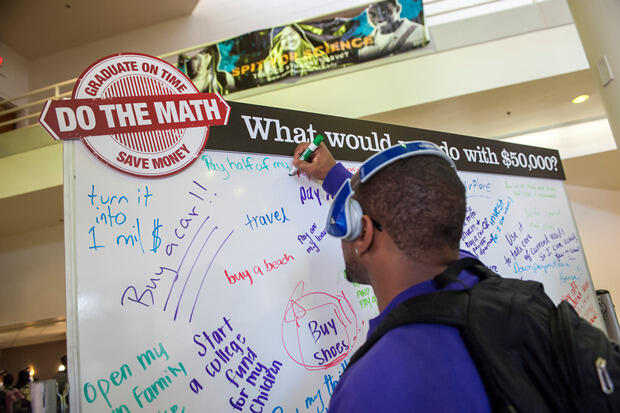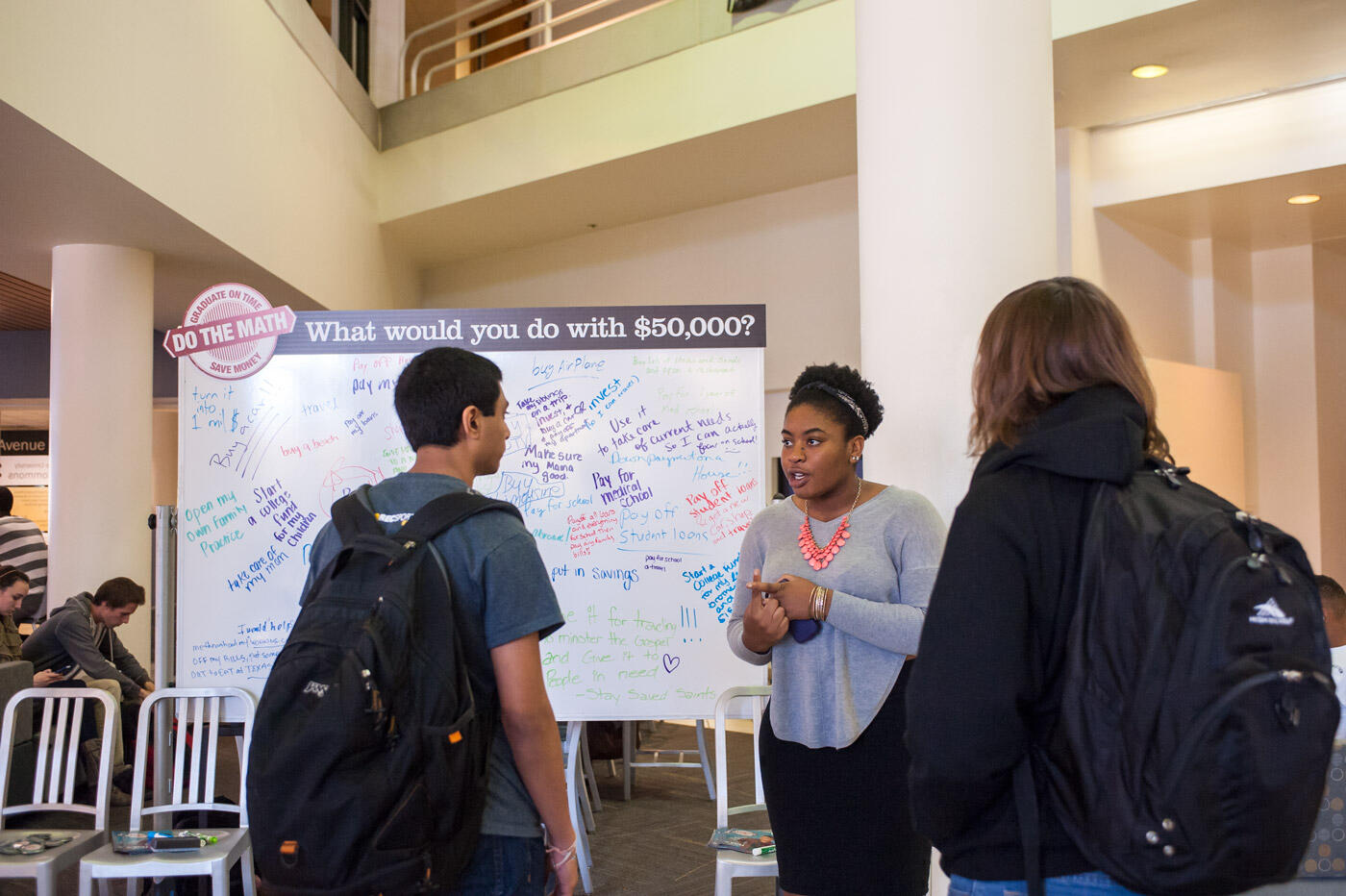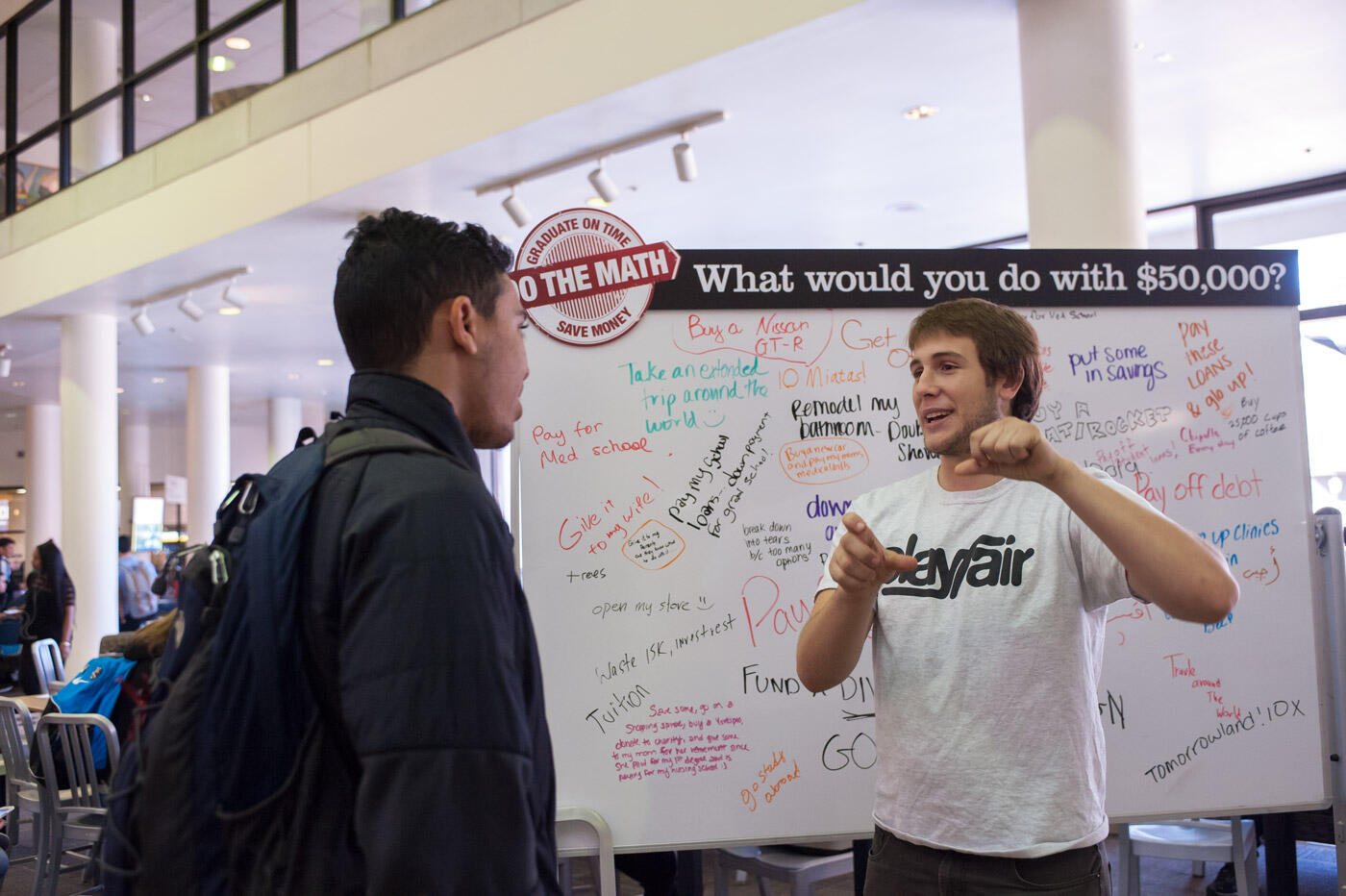
Oct. 24, 2014
‘Do the math’ is adding up for an increasing number of VCU students
Effort encourages students to take 15 credits a semester, graduate in four years to save $50,000
Share this story
On a pair of dry-erase boards in the middle of the University Student Commons, Virginia Commonwealth University students this week shared dreams of how they would spend $50,000.
Some ideas were practical: put the money toward buying a house, help a parent with medical bills, start a college fund for a younger brother or sister. Other students would use the money to make a difference in the world by supporting a clinic in a third-world country or an orphanage or by giving back to their local communities. And there were some self-indulgent ideas: buy an airplane, buy a beach or eat Chipotle every day.
The students had fun dreaming about spending the money. And they were surprised to learn that the $50,000 financial windfall could be real for those who commit to taking 15 credits each semester and working to graduate in four years as part of VCU’s “Do the math: 15/4” campaign.

“I wish all of my friends understood the importance of how graduating on time saves money,” said Chinyere Onyirimba, a senior from Norfolk, Virginia, who is pursuing a degree in health preparation and professional science.
Onyirimba has stuck with a plan to graduate in four years, which she said hasn’t always been easy but is manageable. As the first of four children in her family to go to college, she wanted to set an example for her younger siblings.
“They’re watching,” Onyirimba said.
And Onyirimba hopes undergraduates at VCU are paying attention too. She and other students volunteered to support “Do the math” by staffing the dry-erase board and passing out information.
Those who stopped by were surprised to learn that in-state students could realize $50,000 in savings on the cost of their education through lowered spending on tuition and fees, books and other supplies, housing and associated living costs, transportation, and other miscellaneous expenses.
Dominic Gavan, another “Do the math” volunteer, said food, housing and transportation costs all add up fast.
“It’s important for me to be in charge of my economic situation,” said Gavan, a sophomore from Leesburg, Virginia, who is pursuing a degree in biology. “$50,000 is a massive amount of money.”

“Do the math” was launched last year and is already starting to pay off for an increasing number of students. Eighty-three percent of VCU freshmen registered for at least 15 credit hours this fall, up from 73 percent last year. Two years ago, before the program launched, that number stood at 61 percent.
There is also an upward trajectory in the participation rate for transfer students. Forty-seven percent of transfers registered to take at least 15 credits this fall, compared to 45 percent a year earlier and 37 percent two years ago prior to the start of the program.
Students are getting the message because it is delivered consistently, starting with freshman orientation and continuing during counseling sessions with financial aid and academic advisers, according to Luke Schultheis, vice provost for the Division of Strategic Enrollment Management, who said “Do the math” is much more than a marketing campaign.
“It has become a part of the fabric of this institution,” Schultheis said. “It is so ‘owned’ institutionally that no matter whom you ask — whether they are from academic advising, provide student support services or are from one of the schools — everyone is committed to not only helping students manage their debt but to actually help decrease the amount of student debt.”
To support “Do the math,” VCU is offering several software programs to help students stay on track.
For example, Student Success Collaborative blends technology, research and analytics to promote academic success by providing students with precise academic advising. The software helps in the early identification of students who need assistance in foundational coursework and provides students with an analysis based on academic progress that could help students decide whether to continue in their chosen major or change directions.
VCU also offers the Schedule Planner, which allows students to plan their lives around a 15-credit schedule.
“This is particularly valuable in helping students enroll in a class that is essential to their degree,” Schultheis said. “Anchoring a particular professor or class and hitting a button will set up an entire class schedule with 15 credits, which reduces their time to degree.”
And Degree Works is a tool that tracks students’ course-taking patterns in relation to their declared degree to help ensure each undergraduate baccalaureate or certificate student understands course requirements for graduation.
In all three examples, the focus is not on relying on a computer program to become a replacement for interaction with an adviser, but rather how the software enhances a student’s interaction with an adviser.
‘Do the math’ is a testament that students come first. This program reflects the seriousness of VCU in helping our students. Nothing could be more exciting.
“The advisers are accountable for the progress of the students in their portfolio and have established metrics to gauge how their students are faring,” Schultheis said.
Schultheis said with no additional staff required, the costs of implementing “Do the math” are minimal but the payoff for students is huge.
“‘Do the math’ is a testament that students come first. This program reflects the seriousness of VCU in helping our students. Nothing could be more exciting,” Schultheis said. “There is no question that we are absolutely in the forefront of enrollment management. I have yet to find another institution which is so widely engaged and dedicated to student success. All of our initiatives complement each other and are solely focused upon supporting the students.”
For more information about “Do the math,” including related resources, visit dothemath.vcu.edu.
Subscribe for free to the weekly VCU News email newsletter at http://newsletter.news.vcu.edu/ and receive a selection of stories, videos, photos, news clips and event listings in your inbox every Thursday. VCU students, faculty and staff automatically receive the newsletter.
Subscribe to VCU News
Subscribe to VCU News at newsletter.vcu.edu and receive a selection of stories, videos, photos, news clips and event listings in your inbox.












